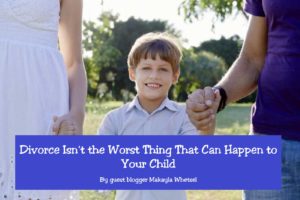50% of all children in the United States will witness a divorce between their parents. While it would be wonderful if every child could grow up in a home with two loving parents, that’s sadly not reality today. However, divorce doesn’t immediately result in the end of a child’s happiness or success.
Divorce is not a decision that should be taken lightly. No matter the situation, divorce will have an impact on both the parents and their children. Nevertheless, in some cases kids are actually better off because of how the marital relationship affected them prior to the parental split. And as parents, there are multiple ways you can help your child adjust to make the transition smoother.
Staying Together Isn’t Always the Best Solution
Many parents who consider getting a divorce worry that this decision will completely ruin their children and their future. And their fears are somewhat justified when one considers the research showing the negative effects that divorce can have on children. Because of this fear, some parents might think that for the kids, it’ll be better if mom and dad just “tough it out.” However, choosing to stay together no matter what may actually do more harm than good.
If divorce is on the table, parents will need to juggle the financial and emotional effects the decision will have on the family. Mild depression, anxiety, and anger are common responses among children with divorced parents. On the other hand, divorce is an important option to protect a spouse or kids from toxic relationships.
Because of the toll that divorce can take on the spouses involved, let alone a whole family, many parents just drop the idea completely. Of course, when marital problems arise and divorce is coming into the picture, it doesn’t mean that divorce has to be the answer.
Divorce Alternatives
Marriage therapy, personal counseling, and honest conversations about what the actual problems are (e.g. pride and self-centeredness) rather than the symptoms (e.g. communication style or personality differences) can be incredibly beneficial.
Before making the huge decision of whether or not you should get divorced, one should first do some very honest self-reflection — especially with the help of a licensed therapist. Dr. William J. Doherty, a marriage and family therapist and professor of family social science, explains that licensed therapists can “challenge both you and your spouse about your contributions to the problems and your capacity to make individual changes to resolve the problems.” Reflecting on your personal contributions to the relationship will not only benefit you as an individual, but it will benefit your relationship as a whole.
While getting professional help is an important step, it’s also important to remember that you can’t change someone else. True change can only happen if it originates from within. If a relationship isn’t evolving because changes are not being made, divorce may be the result.
Choosing To Divorce
Now, let’s suppose that you end up choosing to get a divorce. The change is going to hurt no matter what the situation is, because you and your children now have to adapt to a new normal.
However, this huge change doesn’t have to ruin your kids. In fact, according to one study, “there is some evidence to suggest that the majority of children whose parents divorced are not indistinguishable from their peers whose parents remained married.”
Scores of studies have found that children form habits quickly by watching and observing those around them. If a child’s parents are displaying a verbally or physically abusive relationship, that child won’t know the difference between the parental relationship they witnessed and a healthy relationship.
While a divorce will be difficult for the children, the changes that children experience aren’t all negative. For example, children who are no longer exposed to constant arguing, verbal or physical abuse, or unstable communication between their parents will be relieved and greatly benefited in their future. Additionally, according to child development experts, children have a built in “resiliency mechanism” that helps them to learn and bounce back from difficult circumstances with the right kind of help.
Emily’s Story
One of my best friends had an experience in which her parents got divorced when she was seven years old. I was curious about how the divorce impacted her and her family. So, I reached out to her for an interview.
Me: Looking back now, what do you think influenced the decision to get a divorce?
Emily: Growing up my father was very neglectful towards me, my mother, and my brother. Because of this, my mother decided that she wanted a divorce.
Me: At the time, how did your family process the divorce? What decisions did your parents make in hopes of making it a reasonable decision?
Emily: My mom allowed my brother and I to choose the amount of involvement we had with my dad. At the beginning of the divorce I spent weekends and every other Wednesday with him and then we rotated holidays. So if I spent Thanksgiving with my mom I spent Christmas with my dad, and vice versa. I wanted to see my dad as often as I could because I wanted to still have a relationship with him, but there were multiple times when he wouldn’t show up or he’d bail before I came. So, then I started reducing my visits to once a week. Unfortunately my dad could never move past his neglectful habits, and eventually I stopped doing in-person visits all together and instead we did phone calls and emails. However, about seven years ago my father just stopped replying all together, so now I’ve completely lost all contact with him.
Me: Lastly, how has your parents’ divorce influenced both you and your brother?
Emily: It allowed both of us to have complete control and it helped me to establish my self worth not only as a daughter, but as a person. If they hadn’t divorced, I would’ve been forced to suffer my dad’s neglect and I believe it would have greatly damaged my self esteem and my idea of what healthy love looks like.
How Can I Help My Child?
If you and your spouse decide that divorce is the answer, it’s possible to help your child(ren) through every step to make the new situation sustainable. Here are a few ways you can make it easier for your kids:
- Provide emotional support
- Have open and honest conversations about how your child is feeling
- Prepare yourself for tough conversations
- Ask your child how they’re doing on a regular basis
By doing this, you will create an appropriate outlet that allows your children to express their emotions in a healthy way. Many adolescents seek out alcohol and drugs if their emotional needs aren’t being met, so building a loving and healthy relationship between you and your child is key.
Although most divorce is avoidable and unnecessary, at times it can be the best option. In some cases divorce may be better for the entire family if things are beyond repair and the family climate is incredibly toxic. Every child deserves to dwell in a home where healthy relationships are present so that in the future, they can develop healthy relationships of their own.






